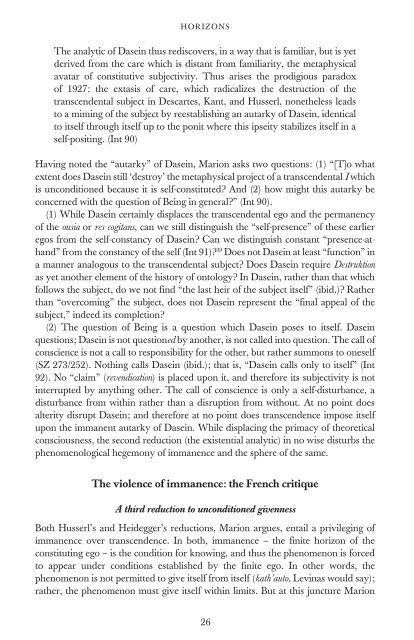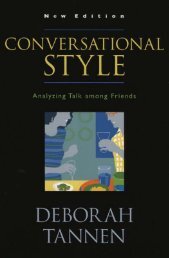Speech and Theology: Language and the Logic of Incarnation
Speech and Theology: Language and the Logic of Incarnation
Speech and Theology: Language and the Logic of Incarnation
Create successful ePaper yourself
Turn your PDF publications into a flip-book with our unique Google optimized e-Paper software.
HORIZONS<br />
The analytic <strong>of</strong> Dasein thus rediscovers, in a way that is familiar, but is yet<br />
derived from <strong>the</strong> care which is distant from familiarity, <strong>the</strong> metaphysical<br />
avatar <strong>of</strong> constitutive subjectivity. Thus arises <strong>the</strong> prodigious paradox<br />
<strong>of</strong> 1927: <strong>the</strong> extasis <strong>of</strong> care, which radicalizes <strong>the</strong> destruction <strong>of</strong> <strong>the</strong><br />
transcendental subject in Descartes, Kant, <strong>and</strong> Husserl, none<strong>the</strong>less leads<br />
to a miming <strong>of</strong> <strong>the</strong> subject by reestablishing an autarky <strong>of</strong> Dasein, identical<br />
to itself through itself up to <strong>the</strong> ponit where this ipseity stabilizes itself in a<br />
self-positing. (Int 90)<br />
Having noted <strong>the</strong> “autarky” <strong>of</strong> Dasein, Marion asks two questions: (1) “[T]o what<br />
extent does Dasein still ‘destroy’ <strong>the</strong> metaphysical project <strong>of</strong> a transcendental I which<br />
is unconditioned because it is self-constituted? And (2) how might this autarky be<br />
concerned with <strong>the</strong> question <strong>of</strong> Being in general?” (Int 90).<br />
(1) While Dasein certainly displaces <strong>the</strong> transcendental ego <strong>and</strong> <strong>the</strong> permanency<br />
<strong>of</strong> <strong>the</strong> ousia or res cogitans, can we still distinguish <strong>the</strong> “self-presence” <strong>of</strong> <strong>the</strong>se earlier<br />
egos from <strong>the</strong> self-constancy <strong>of</strong> Dasein? Can we distinguish constant “presence-ath<strong>and</strong>”<br />
from <strong>the</strong> constancy <strong>of</strong> <strong>the</strong> self (Int 91)? 39 Does not Dasein at least “function” in<br />
a manner analogous to <strong>the</strong> transcendental subject? Does Dasein require Destruktion<br />
as yet ano<strong>the</strong>r element <strong>of</strong> <strong>the</strong> history <strong>of</strong> ontology? In Dasein, ra<strong>the</strong>r than that which<br />
follows <strong>the</strong> subject, do we not find “<strong>the</strong> last heir <strong>of</strong> <strong>the</strong> subject itself” (ibid.)? Ra<strong>the</strong>r<br />
than “overcoming” <strong>the</strong> subject, does not Dasein represent <strong>the</strong> “final appeal <strong>of</strong> <strong>the</strong><br />
subject,” indeed its completion?<br />
(2) The question <strong>of</strong> Being is a question which Dasein poses to itself. Dasein<br />
questions; Dasein is not questioned by ano<strong>the</strong>r, is not called into question. The call <strong>of</strong><br />
conscience is not a call to responsibility for <strong>the</strong> o<strong>the</strong>r, but ra<strong>the</strong>r summons to oneself<br />
(SZ 273/252). Nothing calls Dasein (ibid.); that is, “Dasein calls only to itself” (Int<br />
92). No “claim” (revendication) is placed upon it, <strong>and</strong> <strong>the</strong>refore its subjectivity is not<br />
interrupted by anything o<strong>the</strong>r. The call <strong>of</strong> conscience is only a self-disturbance, a<br />
disturbance from within ra<strong>the</strong>r than a disruption from without. At no point does<br />
alterity disrupt Dasein; <strong>and</strong> <strong>the</strong>refore at no point does transcendence impose itself<br />
upon <strong>the</strong> immanent autarky <strong>of</strong> Dasein. While displacing <strong>the</strong> primacy <strong>of</strong> <strong>the</strong>oretical<br />
consciousness, <strong>the</strong> second reduction (<strong>the</strong> existential analytic) in no wise disturbs <strong>the</strong><br />
phenomenological hegemony <strong>of</strong> immanence <strong>and</strong> <strong>the</strong> sphere <strong>of</strong> <strong>the</strong> same.<br />
The violence <strong>of</strong> immanence: <strong>the</strong> French critique<br />
A third reduction to unconditioned givenness<br />
Both Husserl’s <strong>and</strong> Heidegger’s reductions, Marion argues, entail a privileging <strong>of</strong><br />
immanence over transcendence. In both, immanence – <strong>the</strong> finite horizon <strong>of</strong> <strong>the</strong><br />
constituting ego – is <strong>the</strong> condition for knowing, <strong>and</strong> thus <strong>the</strong> phenomenon is forced<br />
to appear under conditions established by <strong>the</strong> finite ego. In o<strong>the</strong>r words, <strong>the</strong><br />
phenomenon is not permitted to give itself from itself (kath’auto, Levinas would say);<br />
ra<strong>the</strong>r, <strong>the</strong> phenomenon must give itself within limits. But at this juncture Marion<br />
26



